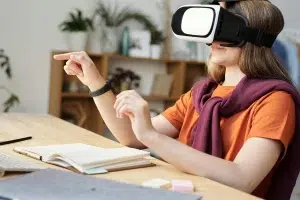VR headsets allow us to step into vast virtual worlds. What does that mean for our brains?
Virtual reality technology is the most advanced and affordable it’s ever been, and the tools to create immersive environments are just a few clicks away. Are we destined for a dystopian future, lost to computer-generated isolation?
On the contrary, VR devices have been put to good use in clinical settings for research and therapy. Our brains react to their hyper-realistic simulations, but without any of the physical dangers.
In this episode, we discuss:
- How VR gadgets trick your brain into forgetting you’re in a virtual reality
- The clever ways VR game designers prevent us from feeling motion sickness
- How VR has been used in treating conditions like PTSD and ADHD
- The early uses of VR tech in neurological studies, back in the 90s
- The ethical responsibility we all have to adopt these technologies with a healthy degree of caution
We’re joined by two experts at the intersection of VR and neuroscience: Albert ‘Skip’ Rizzo, Research Director at USC Institute for Creative Technologies for Medical Virtual Reality, and Dr. Adam Gazzaley, co-founder and Chief Science Advisor of therapeutic video game development company Akili Interactive.
Links
Albert ‘Skip’ Rizzo
Dr. Adam Gazzaley











